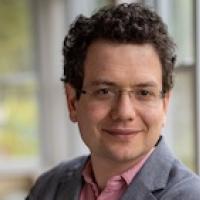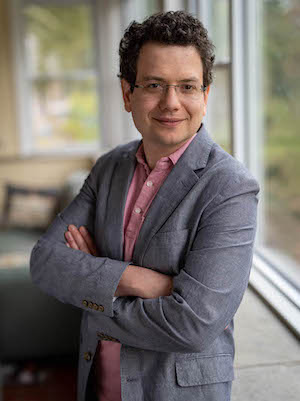
A short introduction to the work of Mark Braverman
This is an easy introduction to the work of Mark Braverman, you can read more of the mathematical details in this article.
Mark Braverman of Princeton University has been awarded the 2022 Abacus Medal at the International Congress of Mathematicians. The Abacus Medal is awarded for "outstanding contributions in Mathematical Aspects of Information Science". The Medal used to be called the Rolf Nevanlinna prize, and is awarded every four years at the International Congress of Mathematicians.

Mark Braverman (Photo Lance Murphey)
Braverman won the prize for his "path-breaking research developing the theory of information complexity." He said his overall goal is to understand computation, both because it is a fundamental intellectual pursuit, just like studying black holes or prime numbers, but also because computation is now embedded in our daily lives. "Computers and communication are now so cheap they're part of many devices – even a toaster is a computer!"
From a mathematical theory of communication
"Shannon's classical information theory is a beautiful area that explains communication," says Braverman. "There are still open problems, but communication is mathematically extremely well understood."
See here for all our coverage of the ICM 2022 and the prizes awarded there.
Braverman is referring to the mathematician Claude Shannon, who developed many of the key ideas used in digital communication today in the 1940s. Shannon realised that binary digits, better known as bits, lay at the heart of information technology. Any type of information, be it pictures, music or words, can be encoded in strings of these 0s and 1s. Shannon worked out the minimum number of bits you need to encode the symbols from any alphabet, be it the 26 letters we use to write with, or the numbers that encode the colours in a picture.
To a mathematical theory of computation
The clear mathematical framework developed in information theory has led to communication being very well understood, with clear mathematical bounds on things like how much information you can transmit.
In contrast, a similar mathematical framework is not nearly so well developed for studying computation. Braverman compared the precise answers available for communication, to the open fundamental questions in computation, such as how long a computational task, such as factoring a number, will take.
Braverman's groundbreaking idea was to bring communication into the picture. He is being awarded the Abacus Medal for his "development of the theory of information complexity, the interactive analog of Shannon’s information theory." The goal of this new field of information complexity is to apply the mathematical framework from information theory to computational settings. "In hindsight it’s almost obvious that information theory should be a core tool, and hopefully now it's a little more central to our understanding," says Braverman.
Fundamental understanding
For those of us outside of computer science we might think the biggest motivation would always be the applications, but it is the field’s deep questions that motivate Braverman. "My main goal is a mathematical tool for understanding computation," he says. And this understanding could shed some fundamental insights.
"We've seen the stars for hundreds of thousands of years, we've had the natural numbers for 5000 years, and we've only been thinking of computation for about 100 years. But somehow, if we met aliens, they'd have looked at black holes, they’d have thought about prime numbers, and they probably have thought about computation. It's hard to imagine being advanced and not realising that [computation] is this basic process that you can abstract. Computation is basic, and it's important to understand its properties in the same way it is important to care about if the Universe is expanding or whether the Riemann hypothesis is true."
About this article
Marianne Freiberger and Rachel Thomas, Editors of Plus, interviewed James Maynard in June 2022.This content was produced as part of our collaborations with the London Mathematical Society and the the Isaac Newton Institute for Mathematical Sciences. You can find all our content on the 2022 International Congress of Mathematicians here.

